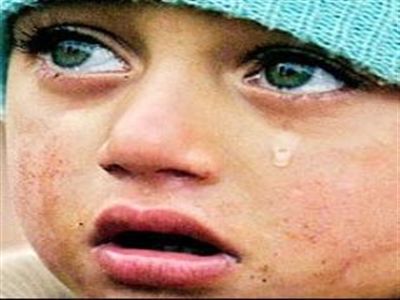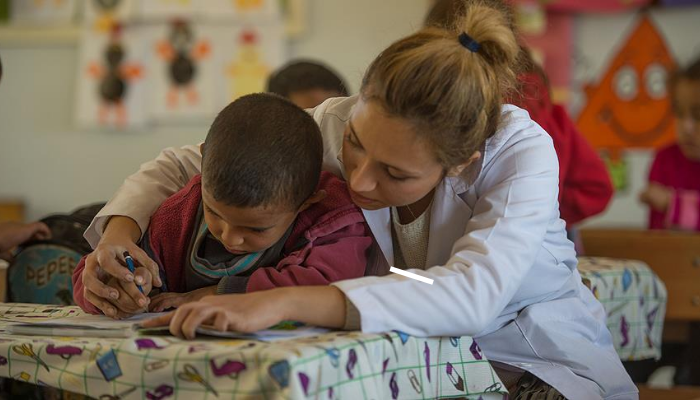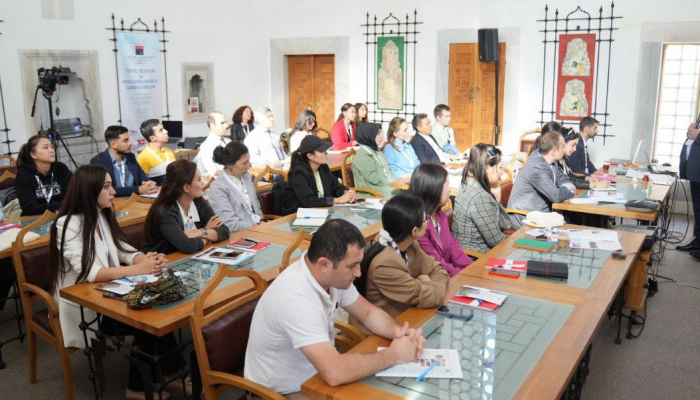The Children's Society's Good Childhood Report says well-being has dipped since 2008 after a period of improvement from 1994.Teenagers aged 14 and 15 are said to have the lowest self-satisfaction, with 15% reporting low well-being.The charity says the drop should not be dismissed as normal early-teen angst.About 42,000 eight to 17-year-olds were quizzed about their well-being using a mix of extensively trialled questions.The report found that around four-fifths of children could be said to be "flourishing".
This was defined as having scored on or above the mid-point for questions about their life satisfaction and psychological well-being.
'Family conflict'But one in 10 children could be said to have low well-being, defined as scoring below the mid-point for the same questions.
Such children are several times more likely than those with average to high well-being to experience family conflict, bullying, problems in their friendships and other negative experiences.
The researchers said previous research had consistently found that well-being declined between the age of eight and 15.
It added that the new findings showed this age-related downward trend reversed at 16 or 17 for life satisfaction, psychological well-being and choice.
The areas with the greatest falls between eight and 15 concerned school, appearance, money/possessions and the future, the researchers said.
Those with the greatest increases among teenagers aged 15 and 17 are choice, family and appearance.
The researchers added: "Appearance seems to be an aspect of life that is a particular issue for children in their early teenage years. There is a large drop in happiness with appearance between the ages of eight and 12, which continues at a low level for 13, 14 and 15-year-olds, and then increases again at 16 and 17 years old."
'Incredibly worrying'Children said that having loving and supportive family relationships was important. Having a reasonable level of choice and autonomy - particularly for teenagers - was vital.
Chief executive of the Children's Society Matthew Reed said: "The well-being of our future generation in the UK is critical, so it is incredibly worrying that any improvements this country has seen in children's well-being over the last two decades appear to have stalled.
"These startling findings show that we should be paying particular attention to improving the happiness of this country's teenagers. These findings clearly show that we can't simply dismiss their low well-being as inevitable 'teen grumpiness'.
*****
"They are facing very real problems we can all work to solve, such as not feeling safe at home, being exposed to family conflict or being bullied."
The charity said it did not know why well-being appeared to have stalled but indicated that issues such as poverty and unemployment that could be connected with the economic downturn might be part of the cause.
Psychologist Linda Papadopoulos said it was important not to dismiss this dip in well-being among 14 and 15-year-olds as inevitable and "just teenagers being teenagers".
"We really must talk to this generation and listen to what they have to say.
"Children and teenagers deserve proper support, choices and a decent say in their own lives. Being unhappy is definitely not an inevitable part of growing up. We owe it to our children to help them flourish as much as possible."
Dr Carol Fuller, associate professor of education and assistant director of research at the University of Reading's Institute of Education, said: "That children's wellbeing is on the decline, particularly amongst those aged 14-15, is hardly surprising given the huge amount of stresses placed on them.
"For example, at this age we are asking them to make educational choices that will have consequences for the rest of their lives. We also live in a society that makes judgements about you based on your level of educational 'success', so the pressure to achieve is extraordinary as they enter this period of their lives."
BBC






